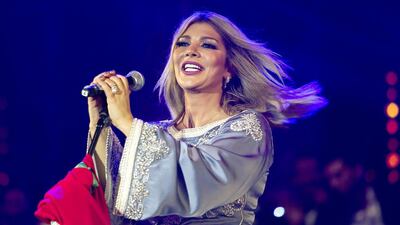Ever since arriving on the scene in 1991, the Syrian singer Assala Nasri maintained her presence on the popular conscience with a career melding the past and the modern.
A prolific artist, the 46-year-old has released more than 20 albums showcasing her vocal command over various genres, including complex classical Arab operettas, Khaleeji and mainstream pop. Nasri has also embarked on a television career, with two seasons as host of her own musical talk show Sola on OSN.
To top it all off, she remains one of the most colourful and headstrong personalities in the entertainment industry, with a reputation for being mercurial and refreshingly direct. “It’s too late for me to have a new personality,” she says from the Mawazine festival in Morocco. “I am who I am and that means normally speaking without a filter.”
It was reported in March that you were in discussions with the broadcaster MBC to replace Sherine Abdelwahab in the upcoming new season of The Voice. How is that going?
First of all, I don’t replace anybody. Also I can say that it is not going to happen. We did have discussions, we didn’t agree on certain things – that I don’t want to get into – and I don’t think we will ever agree because we have too many differences.
What about those rumours that the upcoming season of your OSN show Sola will be the final one?
Yes, this will be my last series. After this I want to work with my darling husband Tito [the Palestinian American director Tarek Al Eryan] on creating a show that would be a dream come true for me: an interactive show screened around the Arab world and the wider global Arab diaspora, where I meet personalities and discuss issues affecting us.
You talk very affectionately about your husband to the press.
Tareq is my husband and I am his woman. He is my friend and my confidant. I love him because he respects me and knows my talents. You know, we travel together, and on one trip we went to the US and I knew he was in a long relationship with a woman who lived there and, you know what, I wanted to meet her.
Oh-oh. That doesn’t sound like a good idea.
No, it’s not like that at all. I wanted to meet her and really get to know her because she, like me, played a big role in developing his character. So I want to know more about this person who was important to him. Besides, anyone who loves Tareq will love me.
Do you feel that with the plethora of talent shows, the industry is focusing more on finding the next new stars as opposed to supporting more established acts?
I wrote about this on Twitter the other day. You know, when you get to a certain established phase of your career, you cease getting support from the industry and the media and your friends.
The problem is that we become bored more easily. We are always looking for the next big thing or the next trend and people forget the artists such as us who are still going strong after 20 years. Now, I am not saying we should not look for new artists: we follow and support them, too. But at the same time, we should also be aware of the established acts who are also evolving in their own way. I don’t feel that my music is stagnant. It’s the opposite. Mentally, I have the same passion and excitement as the days when I first started.
What has been the biggest setbacks you’ve experienced as a result of your fame?
The loss of former friends. Eventually I realised that these friendships were built on artificial terms as opposed to being real. They came about as a result of my fame. They eventually faded away and that upset me because I really value the concept of friendship. I love hanging with friends and being in their company – even if it’s a five-minute chat, I do feel a relaxed change in me and a sense of safety.
Any word on your next album?
I have begun working on an album dedicated to Khaleeji songs. It is in the very early stages, though, and I am working with some people, so let's see how the project goes.
• Next week we chat to Nigerian duo P-Square about becoming one of Africa's best-selling acts and their desire to work with Arab talent


